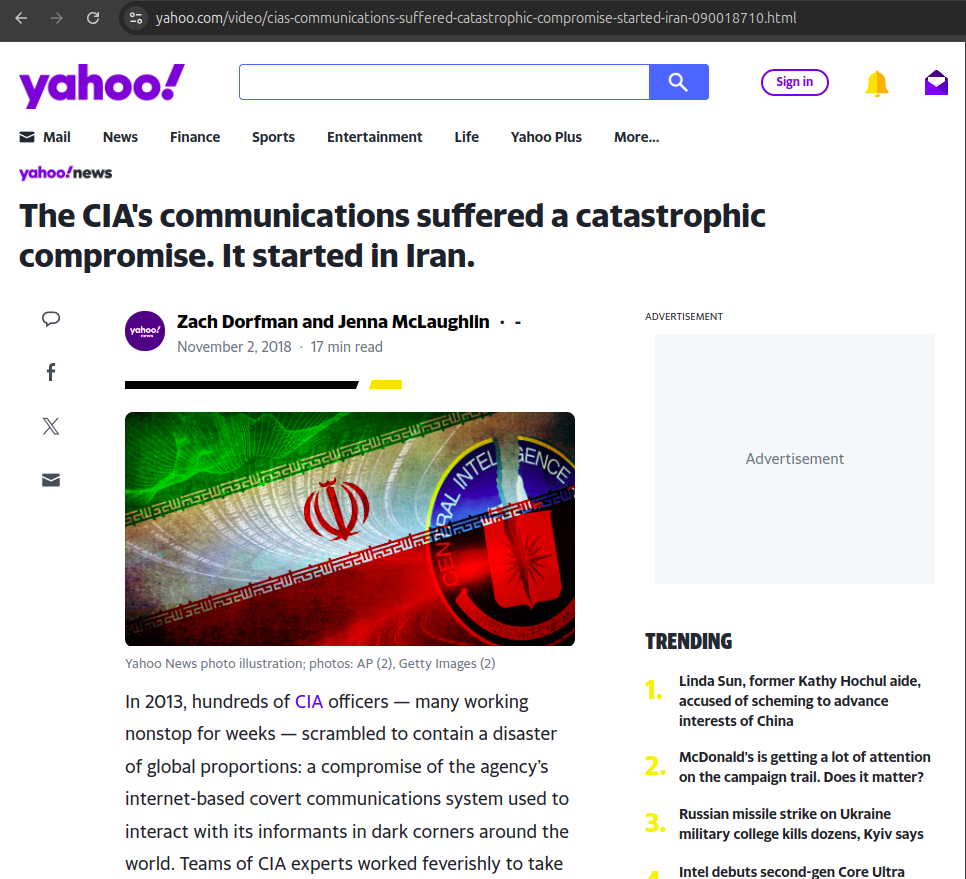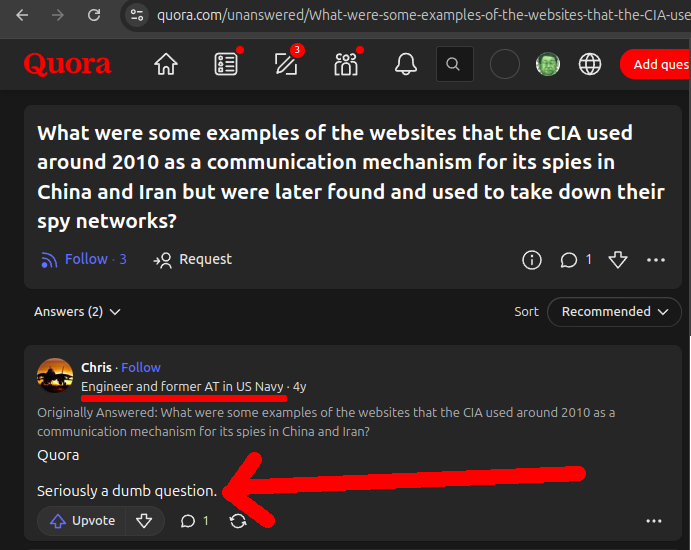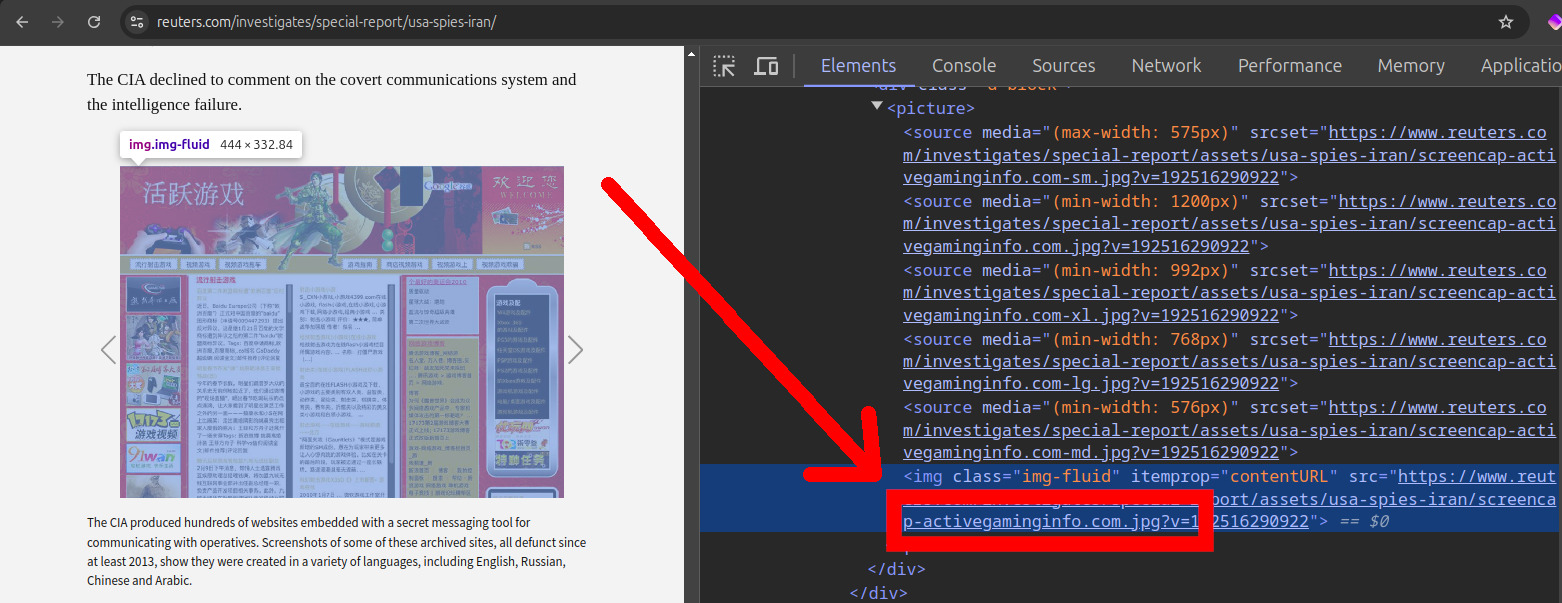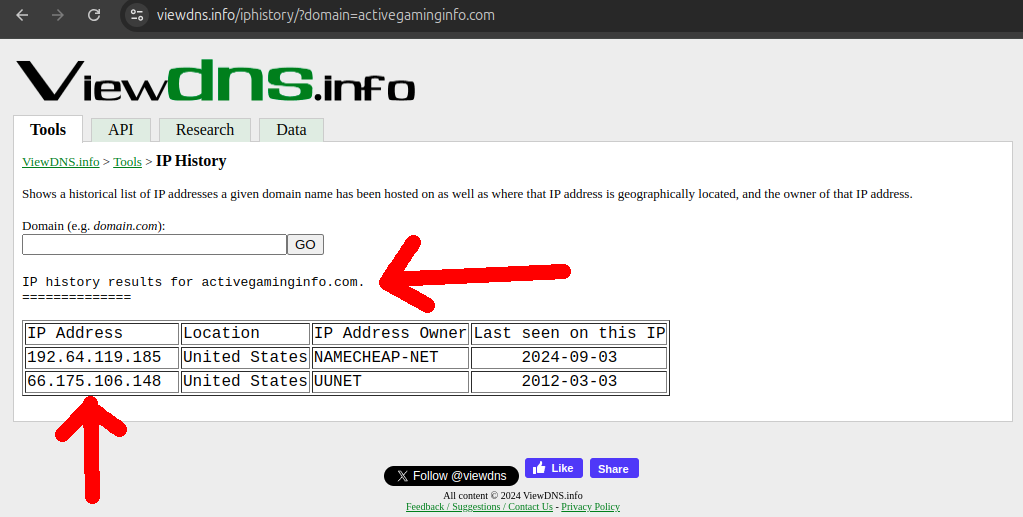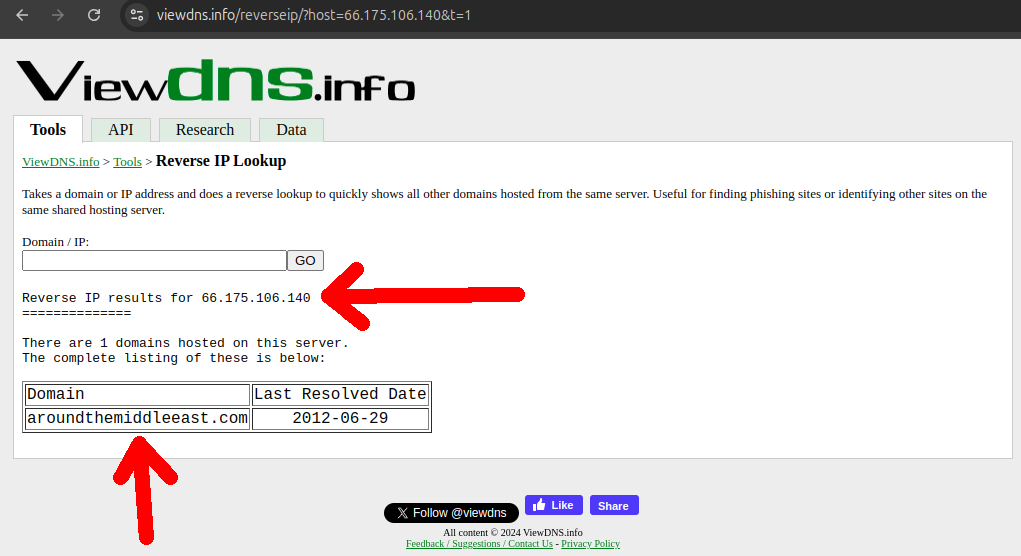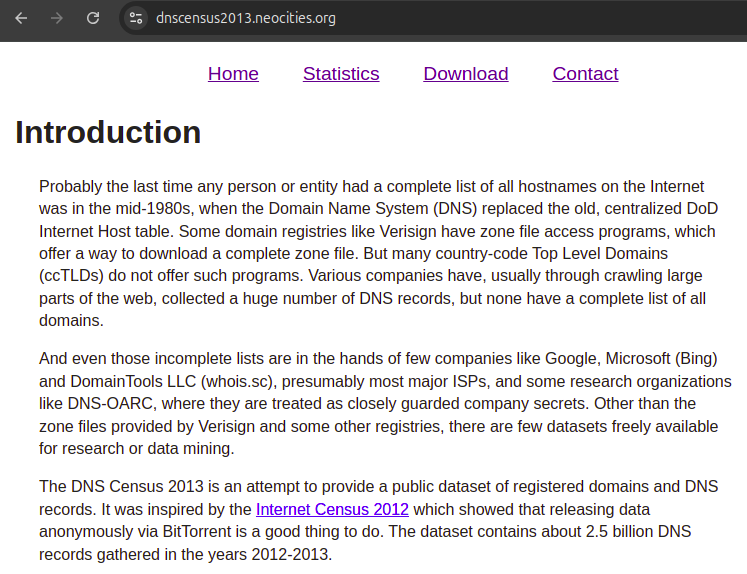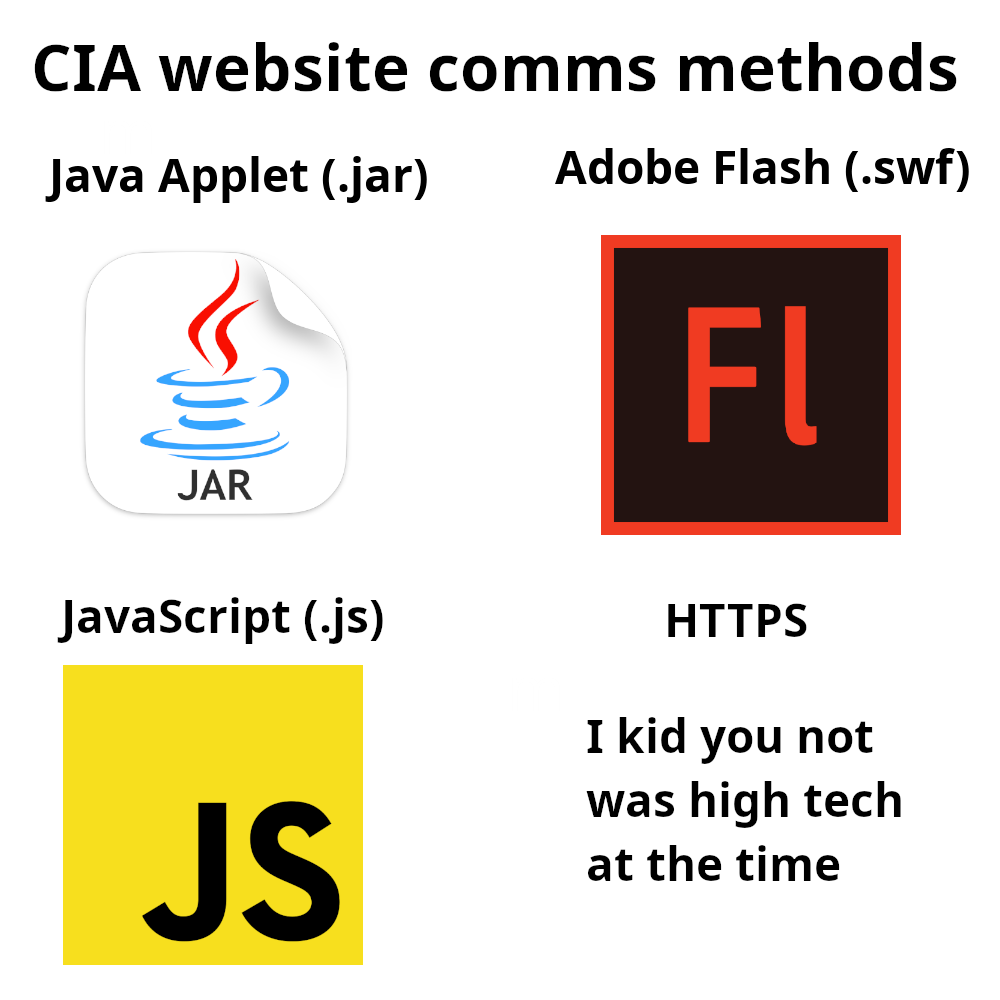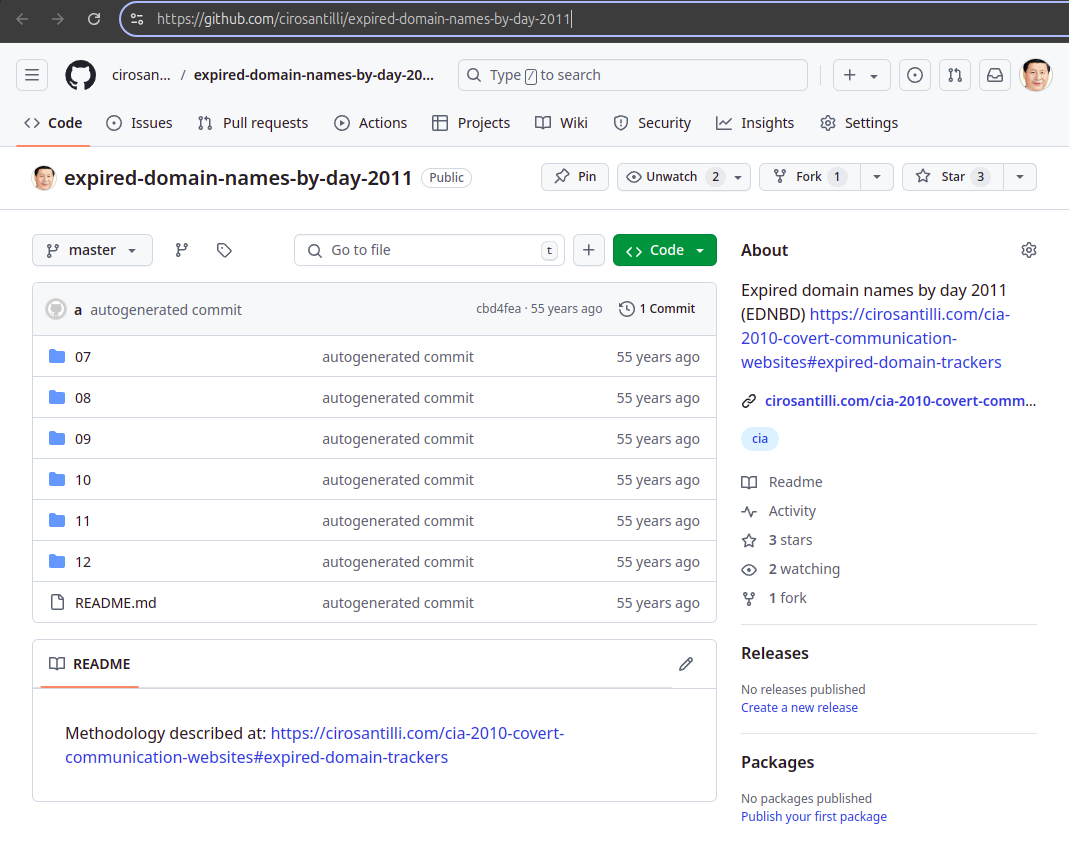Apple Inc. Updated 2025-07-16
- owns the entire stack and creates high quality highly optimized systems
- creates closed lock-in systems without inter-operability and actively fights users from owning their devices
- do they give back enough to open source, or do they leech mostly?
Aratu Week 2024 Talk by Ciro Santilli: My Best Random Projects Prelude: initial reports without specific websites (2018-) Created 2024-09-26 Updated 2025-07-16
CIA 2010 covert communication websites Overview of Ciro Santilli's investigation Created 2025-05-07 Updated 2025-07-19
Ciro Santilli hard heard about the 2018 Yahoo article around 2020 while studying for his China campaign because the websites had been used to take down the Chinese CIA network in China. He even asked on Quora about it, but there were no publicly known domains at the time to serve as a starting point. Chris, Electrical Engineer and former Avionics Tech in the US Navy, even replied suggesting that obviously the CIA is so competent that it would never ever have its sites leaked like that:
Seriously a dumb question.
In 2023, one year after the Reuters article had been published, Ciro Santilli was killing some time on YouTube when he saw a curious video: Video 1. "Compromised Comms by Darknet Diaries (2023)". As soon as he understood what it was about and that it was likely related to the previously undisclosed websites that he was interested in, he went on to read the Reuters article that the podcast pointed him to.
Being a half-arsed web developer himself, Ciro knows that the attack surface of a website is about the size of Texas, and the potential for fingerprinting is off the charts with so many bits and pieces sticking out. And given that there were at least 885 of them, surely we should be able to find a few more than nine, right?
In particular, it is fun how these websites provide to anyone "live" examples of the USA spying on its own allies in the form of Wayback Machine archives.
Given all of this, Ciro knew he had to try and find some of the domains himself using the newly available information! It was an irresistible real-life capture the flag.
Chris, get fucked.
It was the YouTube suggestion for this video that made Ciro Santilli aware of the Reuters article almost one year after its publication, which kickstarted his research on the topic.
Full podcast transcript: darknetdiaries.com/transcript/75/
Ciro Santilli pinged the Podcast's host Jack Rhysider on Twitter and he ACK'ed which is cool, though he was skeptical about the strength of the fingerprints found, and didn't reply when clarification was offered. Perhaps the material is just not impactful enough for him to produce any new content based on it. Or also perhaps it comes too close to sources and methods for his own good as a presumably American citizen.
The first step was to try and obtain the domain names of all nine websites that Reuters had highlighted as they had only given two domains explicitly.
Thankfully however, either by carelessness or intentionally, this was easy to do by inspecting the address of the screenshots provided. For example, one of the URLs was:which corresponds to
https://www.reuters.com/investigates/special-report/assets/usa-spies-iran/screencap-activegaminginfo.com.jpg?v=192516290922activegaminginfo.com.Inspecting the Reuters article HTML source code
. Source. The Reuters article only gave one URL explicitly: iraniangoals.com. But most others could be found by inspecting the HTML of the screenshots provided, except for the Carson website.Once we had this, we were then able to inspect the websites on the Wayback Machine to better understand possible fingerprints such as their communication mechanism.
The next step was to use our knowledge of the sequential IP flaw to look for more neighbor websites to the nine we knew of.
This was not so easy to do because the websites are down and so it requires historical data. But for our luck we found viewdns.info which allowed for 200 free historical queries (and they seem to have since removed this hard limit and moved to only throttling), leading to the discovery or some or our own new domains!
This gave us a larger website sample size in the order of the tens, which allowed us to better grasp more of the possible different styles of website and have a much better idea of what a good fingerprint would look like.
The next major and difficult step would be to find new IP ranges.
This was and still is a hacky heuristic process for us, but we've had the most success with the following methods:
- step 1) get huge lists of historic domain names. The two most valuable sources so far have been:
- step 2) filter the domain lists down somehow to a more manageable number of domains. The most successful heuristics have been:
- for 2013 DNS Census which has IPs, check that they are the only domain in a given IP, which was the case for the majority of CIA websites, but was already not so common for legitimate websites
- they have the word
newson the domain name, given that so many of the websites were fake news aggregators
- step 3) search on Wayback machine if any of those filtered domains contain URL's that could be those of a communication mechanism. In particular, we've used a small army of Tor bots to overcome the Wayback Machine's IP throttling and greatly increase our checking capacity
DNS Census 2013 website
. Source. This source provided valuable historical domain to IP data. It was likely extracted with an illegal botnet. Data excerpt from the CSVs:amazon.com,2012-02-01T21:33:36,72.21.194.1
amazon.com,2012-02-01T21:33:36,72.21.211.176
amazon.com,2013-10-02T19:03:39,72.21.194.212
amazon.com,2013-10-02T19:03:39,72.21.215.232
amazon.com.au,2012-02-10T08:03:38,207.171.166.22
amazon.com.au,2012-02-10T08:03:38,72.21.206.80
google.com,2012-01-28T05:33:40,74.125.159.103
google.com,2012-01-28T05:33:40,74.125.159.104
google.com,2013-10-02T19:02:35,74.125.239.41
google.com,2013-10-02T19:02:35,74.125.239.46The four communication mechanisms used by the CIA websites
. Java Applets, Adobe Flash, JavaScript and HTTPSExpired domain names by day 2011
. Source. The scraping of expired domain trackers to Github was one of the positive outcomes of this project. Ciro Santilli's bad old event memory Updated 2025-07-16
Ciro Santilli has a bad memory for events that happened a medium time ago, for example in order of months/years. Especially if they are one-off things that have no relation to anything else.
For example, Ciro never remembers which places he travelled to just once, and who was in each trip! He has images of several places he travelled to in his head, and would recognize them, but he just doesn't know where they were!
Another example, Ciro was looking at the carpet at their house, and asked where it came from. His wife replied immeidately: from Bercy shopping quarter in Paris about 10 years ago, and you took it on your back for a long walk until we could find the bus back home because we were concerned it wouldn't fit in the train!
The same goes for scenes from movies and passages from music, which explains why Ciro's art consumption focuses on innovative discrete "what happened" and "general gist" ideas, rather than, analog details such as colors and shapes.
Going back even further in time, Ciro starts to forget the less close friends he had, because the events start to fade away.
Paradoxically however, Ciro believes that this bad memory is one of his greatest strengths and key defining characteristics, because it leads Ciro to want to write down every interesting thing he learns, which motivated OurBigBook.com and his Stack Overflow contributions and his related Ciro Santilli's documentation superpowers.
It also somewhat leads Ciro to like physics and mathematics, because in these fields you "can deduce everything" from very few base principles, so if you forget them, it does not matter that much as you can re-deduce stuff over and over. Which is somewhat where the high flying bird attitude comes from. It is hard to go deep when you have to re-prove everything every time. But the upside is that anything that sticks, does so because it has a broad net to stick to, and therefore allows Ciro to make unusual and unexpected connections that others might not.
Ciro believes that there are two types of people, and most notably software engineers, which are basically data wranglers: those with bad memory and those with good memory.
Those with bad memory, tend to focus on automating and improving their processes a lot. They take much longer to do one-off specific deep knowledge tasks however.
The downside of the good memory ones is that sooner or later they will find tasks that no matter how much memory they have, they cannot solve without automation, and they will fail at those.
This dichotomy also explains why Ciro sucks at code reviews, but is rather the person who runs the interesting patches by himself and finds some critical problems that the more theoretical code reviewers missed.
If Ciro had become a scientist, he would without doubt be an experimentalist, just like in this reality he is a GDB/runtime person rather than a "static source analysis" person. Those who have bad memory prefer to just run experiments over and over and observe system state at runtime.
Other effects of having a bad memory include:
- code duplication, or a constant fear of it at least, because Ciro forgets that some functionality exists already
- meeting aversion, because everything that is not recorded will fade away
- passion for backward design, because by the time a piece of knowledge learnt in school might be useful (and 99.99% won't), it will have been long forgotten
Related: jakobschwichtenberg.com/about/ from Jakob Schwichtenberg:
In some sense, one of the biggest benefits I have over other people in physics is that I'm certainly not the smartest guy! I usually can't grasp complex issues very easily. So I have to break down complex ideas into smaller chunks to understand it myself. This means, whenever I describe something to others, everyone understands, because it's broken down into such simple terms.
On C2 wiki, therefore it cannot be wrong wiki.c2.com/?QuasiGreatTeacher:
EPUB Updated 2025-07-16
This is a good thing. It basically contains an entire website, with HTML and assets inside a single ZIP, and a little bit of metadata.
It is incomprehensible why browsers don't just implement it as they already have all the web part, and also ZIP stuff:
FFmpeg is the backend of YouTube Updated 2025-07-16
Game AI research lab Updated 2025-07-16
The Quora question: www.quora.com/Are-there-any-PhD-programs-in-training-an-AI-system-to-play-computer-games-Like-the-work-DeepMind-do-combining-Reinforcement-Learning-with-Deep-Learning-so-the-AI-can-play-Atari-games
How computers work? Updated 2025-07-16
A computer is a highly layered system, and so you have to decide which layers you are the most interested in studying.
Although the layer are somewhat independent, they also sometimes interact, and when that happens it usually hurts your brain. E.g., if compilers were perfect, no one optimizing software would have to know anything about microarchitecture. But if you want to go hardcore enough, you might have to learn some lower layer.
It must also be said that like in any industry, certain layers are hidden in commercial secrecy mysteries making it harder to actually learn them. In computing, the lower level you go, the more closed source things tend to become.
But as you climb down into the abyss of low level hardcoreness, don't forget that making usefulness is more important than being hardcore: Figure 1. "xkcd 378: Real Programmers".
First, the most important thing you should know about this subject: cirosantilli.com/linux-kernel-module-cheat/should-you-waste-your-life-with-systems-programming
Here's a summary from low-level to high-level:
- semiconductor physical implementation this level is of course the most closed, but it is fun to try and peek into it from any openings given by commercials and academia:
- photolithography, and notably photomask design
- register transfer level
- interactive Verilator fun: Is it possible to do interactive user input and output simulation in VHDL or Verilog?
- more importantly, and much harder/maybe impossible with open source, would be to try and set up a open source standard cell library and supporting software to obtain power, performance and area estimates
- Are there good open source standard cell libraries to learn IC synthesis with EDA tools? on Quora
- the most open source ones are some initiatives targeting FPGAs, e.g. symbiflow.github.io/, www.clifford.at/icestorm/
- qflow is an initiative targeting actual integrated circuits
- microarchitecture: a good way to play with this is to try and run some minimal userland examples on gem5 userland simulation with logging, e.g. see on the Linux Kernel Module Cheat:This should be done at the same time as books/website/courses that explain the microarchitecture basics.
- instruction set architecture: a good approach to learn this is to manually write some userland assembly with assertions as done in the Linux Kernel Module Cheat e.g. at:
- github.com/cirosantilli/linux-kernel-module-cheat/blob/9b6552ab6c66cb14d531eff903c4e78f3561e9ca/userland/arch/x86_64/add.S
- cirosantilli.com/linux-kernel-module-cheat/x86-userland-assembly
- learn a bit about calling conventions, e.g. by calling C standard library functions from assembly:
- you can also try and understand what some simple C programs compile to. Things can get a bit hard though when
-O3is used. Some cute examples:
- executable file format, notably executable and Linkable Format. Particularly important is to understand the basics of:
- address relocation: How do linkers and address relocation work?
- position independent code: What is the -fPIE option for position-independent executables in GCC and ld?
- how to observe which symbols are present in object files, e.g.:
- how C++ uses name mangling What is the effect of extern "C" in C++?
- how C++ template instantiation can help reduce link time and size: Explicit template instantiation - when is it used?
- operating system. There are two ways to approach this:
- learn about the Linux kernel Linux kernel. A good starting point is to learn about its main interfaces. This is well shown at Linux Kernel Module Cheat:
- system calls
- write some system calls in
- pure assembly:
- C GCC inline assembly:
- write some system calls in
- learn about kernel modules and their interfaces. Notably, learn about to demystify special files such
/dev/randomand so on: - learn how to do a minimal Linux kernel disk image/boot to userland hello world: What is the smallest possible Linux implementation?
- learn how to GDB Step debug the Linux kernel itself. Once you know this, you will feel that "given enough patience, I could understand anything that I wanted about the kernel", and you can then proceed to not learn almost anything about it and carry on with your life
- system calls
- write your own (mini-) OS, or study a minimal educational OS, e.g. as in:
- learn about the Linux kernel Linux kernel. A good starting point is to learn about its main interfaces. This is well shown at Linux Kernel Module Cheat:
- programming language
Local symmetry Updated 2025-07-16
Local symmetries appear to be a synonym to internal symmetry, see description at: Section "Internal and spacetime symmetries".
A local symmetry is a transformation that you apply a different transformation for each point, instead of a single transformation for every point.
Bibliography:
- lecture 3
- physics.stackexchange.com/questions/48188/local-and-global-symmetries
- www.physics.rutgers.edu/grad/618/lects/localsym.pdf by Joel Shapiro gives one nice high level intuitive idea:
- Quora:
MacOS Updated 2025-07-16
Nice looking and expensive operating system by Apple. Ciro Santilli believes that:
- if you want to be ripped off, just use Microsoft Windows which has more software available
- or if you want to attain Enlightenment, just use Linux, which is free and open source
Molecular Sciences Course of the University of São Paulo Updated 2025-07-16
Good Portuguese overview: www.scielo.br/scielo.php?script=sci_arttext&pid=S1806-11172017000300301&lng=pt&tlng=pt
A fantastic sounding full time 4-year course that any student could transfer to called that teaches various natural science topics, notably mathematics, physics, chemistry and molecular biology.
Many past students Ciro talked to however share a common frustration with the course: in the first 2 years at least, the "basic cycle", you have infinitely many courses, and no time to study, and no choice of what to study, it is only in the latter 2 years (the advanced cycle) that you get the choices.
Also, if you get low grades in a single subject, your out. And exams are useless of course.
Here's a Quora question in Portuguese about the course: pt.quora.com/Como-funciona-o-tal-do-curso-secreto-da-USP, the only decent answer so far being: pt.quora.com/Como-funciona-o-tal-do-curso-secreto-da-USP/answer/Victor-Soares-31. Very disappointing to hear.
On the advanced cycle, you have a lot of academic freedom. You are basically supposed to pick a research project with an advisor and go for it, with a small amount of mandatory course hours. Ciro was told in 2022 that you can even have advisors from other universities or industry, and that it is perfectly feasible to take courses in another university and validate the course hours later on. Fantastic!!!
Students from the entire University of São Paulo can apply to transfer to it only after joining the university, with the guarantee that they can go back to their original courses if they don't adapt to the new course, which is great!
Around 2007, they were in a really shady building of the University, but when Ciro checked in 2021, they had apparently moved to a shiny new entrepreneurship-focused building. Fantastic news!!!
One of the Brazilians who came to École Polytechnique together with Ciro was from this course. The fact that he is one of the most intelligent people Ciro knows gave further credit to that course in his eyes.
Nick Lucid Updated 2025-07-16
Nobel Prize Updated 2025-07-16
Web of Stories contains amazing interviews with many (mostly American) winners.
See Surely You're Joking, Mr. Feynman chapter Alfred Nobel's Other Mistake's amazing comments about the Nobel Prize.
TODO who is the digital switch person he mentions?
- www.quora.com/unanswered/Who-was-Richard-Feynman-referring-to-in-the-book-Surely-Youre-Joking-Mr-Feynman-chapter-Alfred-Nobels-Other-Mistake-when-he-talks-about-A-friend-of-mine-whos-a-rich-man-he-invented-some-kind-of-simple-digital-switch on Quora
- github.com/cirosantilli/cirosantilli.github.io/issues/72
OurBigBook.com Alternatives Updated 2025-07-16
These are websites that offer somewhat overlapping services, many of which served inspirations, and why we think something different is needed to achieve our goals.
Notably, OurBigBook is the result of Ciro Santilli's experiences with:OurBigBook could be seen as a cross between those three websites.
- Wikipedia
- GitHub
- Stack Exchange (or as non techies might point out, Urban Dictionary, or Quora before it was such an incomprehensible shitshow)
Quick mentions:
- handwiki.org/wiki/HandWiki:About: technically the same as Wikipedia, but with more aligned moderation policies
- ecotext.co/ similar goals. Their website seems quite broken now though as of 2021, can't see text properly. Crunchbase entry: www.crunchbase.com/organization/ecotext says they are from Durham, New Hampshire, United States. Cannot see how to publish, curated material only? Twitter: twitter.com/ecotextinc?lang=en One of the founders: twitter.com/BigNel_21 | www.linkedin.com/in/ecotextnelsonthomas/. Their LinkedIn: www.linkedin.com/company/ecotext/people/
- fiveable.me/ bad: separates students and teachers, as a student I don't see where to create my content. Good: focus on teaching university level stuff to people outside of university via Advanced Placement. Bad: Lots of video content. Bad: Can't see the issue tracker attached to each page.
- LessWrong: their website system does have some similar feature sets to what we want. Reputation, Q&A sections, links between articles most likely, sort by upvote everywhere.
- crowdpub.org collaborative writing website, somehow goes to paragraph level, TODO how they reconcile different authors? Closed beta as of writing, so hard to be sure. From quick presentation on beta website, appears to attempt to share revenue to authors proportionally to the size of their contribution. Some blockchain-based reputation. Meh.
- TODO migrate all from: github.com/booktree/booktree/blob/master/alternatives.md
- studynotes.ie/. Admin approval on everything. No ToC. Fixed tag list for university entry exams topics.
- mindstone.com: there appears to be no sharing focus? File upload basesd? Not sure.
- EverybodyWiki
- looking for open source Confluence-alternatives is an interesting way to go:
- lists:
- BookStack:
- fixed 3-level page hierarchy
- writen in PHP
- Markdown support: www.bookstackapp.com/docs/user/markdown-editor/
- no source-level import-export apparently: www.bookstackapp.com/docs/admin/backup-restore/, youtu.be/WUvtzJfCAKE?t=904
- WYSIWYG: www.bookstackapp.com/docs/user/wysiwyg-editor/ via TinyMCE
- page content repeating: www.bookstackapp.com/docs/user/reusing-page-content/ (will be useful for course modelling)
- github.com/shuding/nextra converts Markdown links to Next.js links. We should look into how it works.
- zettelkasten.de/the-archive/ "The Archive" from zettelkasten.de/. Closed source. By German software engineer Christian Tietze twitter.com/ctietze?lang=en
- LLM generated wiki e.g.:
- docs.tigyog.app/cli beautiful website, but doesn't achieve much. Has a Markdown upload mechanism. Ah, those newbs who think the average user will care about markup upload to DB... Oh, wait...
- www.stuvia.com/en-gb/school/uk/oxford-university/physics. PDF uploads. In theory you have to own copyright: www.stuvia.com/en-gb/copyright/guidelines but it feels unlikely that most material was uploaded by the copyright owners. If those people are up, then why can't we? Maybe... Registred in the UK. People: some Dutch dudes:
- Project Xanadu: crazy overlaps, though that project is vaporware apparently?
Administrators of Project Xanadu have declared it superior to the World Wide Web, with the mission statement: "Today's popular software simulates paper. The World Wide Web (another imitation of paper) trivialises our original hypertext model with one-way ever-breaking links and no management of version or contents.
Static website-only alternatives:
- quarto.org/
- vitepress.dev. vitepress.dev/guide/markdown unmanaged internal links. Sample website: wiki.nikiv.dev/.
Conceptual:
- The Final Encyclopedia: science fiction concept, but the name was reused by Paul Allen in a research project
- second brain
- collective intelligence
OurBigBook.com Existing data sources Updated 2025-07-16
Some possible/not possible sources that could be used to manually bootstrap content:
- LibreTexts. Good project. "Teacher-only-content" unfortunately as usual. But besides that fundamental flaw, they do exactly what we want to do in a sense.
- OpenStax: CC BY. This could be a great entry point, as they already have some university integration going on, and might be interested in this project.
- physics.stackexchange.com/questions/6157/list-of-freely-available-physics-books "List of freely available physics books" explicitly asks for:but the thread was locked, and basically none of the sources in the answers have free licenses, nor do they note it. It just seems that the physicists don't know what a free license is.
a list of physics books with open-source licenses, like Creative Commons, GPL
- MIT OpenCourseWare: CC BY-NC-SA, so not really usable
- github.com/certik/theoretical-physics: MIT License. Workable but wonky.
- subwiki.org/: wiki with some upper graduate math subjects presumably by this Indian dude: www.linkedin.com/in/vipul-naik-0ab1898/. Description on his homepage: vipulnaik.com/subwiki/. He's also got other interesting but not so relevant projects:He's also into Stack Overflow, Quora and Wikipedia editing. That's a cool dude. He's into in LessWrong it seems.
- pro freer immigration laws: vipulnaik.com/openborders/
- vipulnaik.com/cognito-mentoring/ free mentoring project for interested students
- massive mathematics books
- Infinite Napkin.CC BY-SA mathematics infinite book: github.com/vEnhance/napkin/issues/77. Very similar type of content to what we want in this project!
- Stacks Project
Existing lecture notes by students:
- github.com/mb2g17/NotesNetworkArchive Google Docs-based: docs.google.com/document/d/1OIcQ8dJ_FAhdkirU94M29-ZbNZ4oQs1LbWF3Nz-mq_U/edit#heading=h.vehxib58w1iw. An actual student uploading tons of lecture notes in one coherent system. CC BY-NC-SA unfortunately.
- academia.stackexchange.com/questions/148261/do-you-keep-your-study-notes-publicly-available mentions:Related: academia.stackexchange.com/questions/40381/how-common-is-it-that-professors-have-their-students-write-textbooks
- Cambridge Mathematics Lecture Notes by Dexter Chua (2014-2018)Comments:
Lecture note upload website:
- nexusnotes.com likely illegal reuploads of PDFs from teachers
- www.studocu.com/en-gb Paywall. PDF uploads. Unclear if simple teacher reuploads or actual novel notes.
- www.studydrive.net/
- Chinese GitHub repos. Some of these are very advanced in terms of content quantity and organizational quality! The Chinese are miles ahead in this area:
- github.com/PKUanonym/REKCARC-TSC-UHT Guidance for courses in Department of Computer Science and Technology, Tsinghua University. Chinese. Appears to try and store all past exams.
- github.com/lib-pku/libpku
- github.com/openwhu/OpenWHU: Wuhan University
- github.com/USTC-Resource/USTC-Course: USTC
- github.com/Zeal-L/UNSW: UNSW from Australia, but by a Chinese dude
- github.com/apachecn/mit-18.06-linalg-notes: translation of MIT course to Chinese
- github.com/chenyang1999/MyComputerCollegeCourses: TODO which univeresity
- github.com/elder-frog/OpenCourseCatalog: nothing to do with this project, but since I'm making a list, this dude is copying YouTube videos to Bilibili. And he's edgy anti-CCP on Twitter, what a legend.
- github.com/TheBloodthirster/BUAA_Course_Sharing: en.wikipedia.org/wiki/Beihang_University
- github.com/1051727403/SHU-CS-Source-Share: ShangHai University CS course source code
- github.com/Willie169/tw-gifted-k12-notes: Taiwanese high school notes
Exams uploads:
- questions.tripos.org/part-ib/all/ University of Cambridge Mathematics past examinations
Peer tutoring Updated 2025-07-16
Perl (programming language) Updated 2025-07-16
Quantum field theory bibliography Updated 2025-07-16
Bibliography of the biliograpy:
- physics.stackexchange.com/questions/8441/what-is-a-complete-book-for-introductory-quantum-field-theory "What is a complete book for introductory quantum field theory?"
- www.quora.com/What-is-the-best-book-to-learn-quantum-field-theory-on-your-own on Quora
- www.amazon.co.uk/Lectures-Quantum-Field-Theory-Ashok-ebook/dp/B07CL8Y3KY
Recommendations by friend P. C.:
- The Global Approach to Quantum Field Theory
- Lecture Notes | Geometry and Quantum Field Theory | Mathematics ocw.mit.edu/courses/mathematics/18-238-geometry-and-quantum-field-theory-fall-2002/lecture-notes/
- Towards the mathematics of quantum field theory (Frederic Paugam)
- Path Integrals in Quantum Mechanics (J. Zinn–Justin)
- (B.Hall) Quantum Theory for Mathematicians (B.Hall)
- Quantum Field Theory and the Standard Model (Schwartz)
- The Algebra of Grand Unified Theories (John C. Baez)
- quantum Field Theory for The Gifted Amateur by Tom Lancaster (2015)
Ron Maimon Updated 2025-07-26
Ron Maimon is a male human theoretical physicist with an all but dissertation started in 1995 at Cornell University[ref][ref].
Ron Maimon's Physics Stack Exchange profile picture
. Source. Ron is mostly known for simultaneously:
- the amazing free online content he has published in online forums such as Stack Overflow and Quora, notably about particle physics, until around 2014 when Ron disappeared from the Internet entirely. Ciro Santilli figures he's hanging out with Ettore Majorana somewhere in the metaverse.
- having either been blocked from or quit every single website he participates in, partly due to his highly combative nature, e.g.:He explicitly defends this combative approach at youtu.be/ObXbKbpkSjQ?t=944 from Video 1. "Ron Maimon interview with Jeff Meverson (2014)":
- Physics Stack Exchange: physics.meta.stackexchange.com/users/4864/ron-maimon
physics.meta.stackexchange.com/questions/976/physics-ses-inability-to-deal-with-users-who-are-highly-persistent-have-kook-b user Marty Green makes one of the best characterizations of Ron's approach to science/collaboration:The thing about Ron Maimon is he definitely comes here to talk about physics. I personally can't get into discussions with him for two reasons: first, he's so single-minded in his own point of view that you can't really communicate with him back and forth; secondly, the structure of this forum is simply not conducive to extended discussions. But he sometimes posts things that are so coherently argued and with such intricate detail that even if I can't understand them myself, I just can't believe he's simply pulling this stuff out of his ass.
- physics.meta.stackexchange.com/questions/1376/what-violation-caused-this-suspension user Jerry Schirmer makes another good comment:
- Quora: www.quora.com/profile/Ron-Maimon. Ron was very active on Quora, until he was blocked for his views on the Boston Marathon bombing as mentioned at Video 1. "Ron Maimon interview with Jeff Meverson (2014)"
And notably, relevant to cirosantilli.com/china-dictatorship/stack-overflow-mods-refuse-to-clarify-if-anti-ccp-imagery-is-allowed-or-not-2021In order to have this process work [finding of truth] it is extremely important that the tone is hostile, that it is like a court of law, where you have an adversarial relationship with your opponent. Because if you have a friendly relationship with your opponent, then political consensus is preserved.
and he then also mentions that Wolfgang Pauli was a major proponent of this in physics, and so was Galileo.Unfortunately, when you're in a minority, the only way to correct the consensus view is to just shout it, and repeat it, until people go and look and check for themselves. The reason is that it creates an adversarial atmosphere where the people have to pick sides, and they don't like to pick sides, they would rather have everyone be happy. So when you have to pick sides, what do you do? You either butt out, you just leave it alone, you run away. Or you sit and review the evidence until you know which side to pick.
- Physics Stack Exchange: physics.meta.stackexchange.com/users/4864/ron-maimon
Ron seems to share a few philosophies which Ciro greatly agrees with as part of Cirism, which together with his knowledge of physics, make Ciro greatly respect Ron. Such philosophies include:
- he gives great importance to the history of physics and learning from original papers. He appears to know this insanely well, notably emphasizing that there is value in tutorials written by early pioneers of the field, see also Section "How to teach and learn physics". TODO find quote. Ciro Santilli distinctly remembers one specifically taking about this, but can't find it anymore.
- education views, notably emphasising autodidacticism
- www.quora.com/Why-should-high-school-students-learn-physics/answer/Ron-Maimon, highlighted at gmachine1729.livejournal.com/161418.html: "Why should high school students learn physics?" Answer:Yes, please, give it to me baby:
But they should learn it, preferably on their own, because the school doesn't know how to teach physics. Physics is extremely interesting, even the elementary kind. It takes the mathematics you learn in high school and uses it to describe certain natural phenomenon completely, beyond what was imagined possible in the wildest dreams of people like Pythagoras or Archimedes. If you have a computer, Newton's laws plus a tiny code can produce the motion of the planets around the sun, the motion of a free-twirling baton, the motion of colliding billiards, it's very simple.
- www.quora.com/Why-should-high-school-students-learn-physics/answer/Ron-Maimon, highlighted at gmachine1729.livejournal.com/161418.html: "Why should high school students learn physics?" Answer:
- enthusiasm for molecular biology technologies, seen e.g. at: www.quora.com/Why-are-an-abundance-of-physicists-moving-to-theoretical-biology/answer/Ron-Maimon on Quora:Ciro is actually specifically curious about whole cell simulation which he makes reference to.
[biology] is also clearly going to be the major technology of the 21st century, you should have a sugar outlet next to the electrical outlet, and plug in artificial biological technology made out of artificial cells. To plan these requires a complete method of describing biological cells, a precise model of all the processes, so that you can make artificial ones, and it produces a type of precise control on single-molecule chemistry that makes chemists drool.
- effortless effort and the to explain everything he knows online. These can be seen at www.quora.com/How-do-you-control-your-urge-to-access-the-internet-so-you-can-complete-your-assignments "How do you control your urge to access the Internet so you can complete your assignments?":
- his cheapness as in Ciro Santilli's cheapness as mentioned at youtu.be/ObXbKbpkSjQ?t=2454 from Video 1. "Ron Maimon interview with Jeff Meverson (2014)":Interviewer: there's a question on Quora where you say that you took a vow of poverty when you were very young.Ron: I was ten, I mean, most people would give it up, but I mean I figured I didn't have any need to give it up, so I just kept with it, I mean, I was never was really offered that much more. When we started the startup, I think I was offered 50k, but I said "no, I'll keep it 40k, I took a vow", and then they gave me 40k. And that of sort of set an example, the CEO also took 40k. It was a very good thing because we had very little money, we were a startup, and we were going by seed money.
However he also subscribes to some theories which Ciro Santilli considers conspiracy theories, e.g. his ideas about the Boston Marathon bombing that got him banned from Quora (a ban which Ciro strongly opposes due to freedom of speech concerns!), but the physics might be sound, Ciro Santilli does not know enough physics to judge, but it often feels that what he says makes sense.
chat.stackexchange.com/transcript/message/7104585#7104585 mentions that he was at Cornell University and did all but dissertation, but he mentions that he was still self-taught:This is corroborated e.g. at: web.archive.org/web/20201226171231/http://pages.physics.cornell.edu/~gtoombes/Student_Index.html (original pages.physics.cornell.edu/~gtoombes/Student_Index.html down as of 2023).
Eugene Seidel: On your personal info page you write that you are not a physics Ph.D. but does that mean you were a physics undergrad in college then went to grad school and finished ABD... or are you entirely self taught?Ron Maimon: ABD. I am self- taught though, I only went to school for accreditation. I had a thesis worth of work at the time I left grad-school,Eugene Seidel: ok thanksRon Maimon: I was just kind of sickened by academic stuff that was going on--- large extra dimensions were popular then.
At youtu.be/ObXbKbpkSjQ?t=2454 from Video 1. "Ron Maimon interview with Jeff Meverson (2014)" he mentions his brother is a professor. At physics.stackexchange.com/questions/32382/could-we-build-a-supercomputer-out-of-wires-and-switches-instead-of-a-microchip confirms that his brother's name is "Gaby Maimon", so this neuroscience professor at the Rockerfeller University is likely him: www.rockefeller.edu/our-scientists/heads-of-laboratories/985-gaby-maimon/. Looks, age, location and research interest match.
Some notable technical posts:
Some notable history posts:
- physics.stackexchange.com/questions/18632/good-book-on-the-history-of-quantum-mechanics/18643#18643 about the history of quantum mechanics give the quadratic explanation
- and closely related for the factor 2: physics.stackexchange.com/questions/27847/why-is-there-a-frac-1-2-in-frac-1-2-mv2/27916#27916
Bibliography:
- www.reddit.com/r/DecodingTheGurus/comments/17cb0n8/do_you_remember_ron_maimon_from_the_prepodcast/ "Do you remember Ron Maimon from the pre-podcast era? Where would he rank on the Guru scale?" user JohnFatherJohn comments:
I was actually friends with Ron Maimon at Cornell around 2006-2008. He was doing some research for my undergraduate research advisor and was a regular at a few of the same coffee shops I frequented. He was a legitimate brilliant physicist who had some strange personality quirks and blindspots, but his simultaneous breadth and depth of physics knowledge was staggering. He detested academia and couldn't stay focused on any one given problem for too long before moving on to something else though.
- gmachine1729.livejournal.com/161418.html Ron Maimon answers about physics and math on Quora (part 1) by Sheng Li (2020) contains a selection of some amazing Ron Maimon posts
- www.reddit.com/r/RonMaimon/ someone made a Reddit for him. Less than 100 users as of 2022, but has potential.
- some Quora threads about him, oh the irony:
- www.quora.com/Is-Ron-Maimon-actually-a-pioneer-or-a-jest
- www.quora.com/Are-Ron-Maimons-answers-on-mathematics-physics-and-computer-science-factually-correct
- www.quora.com/What-do-people-think-of-Ron-Maimons-paper-Computational-Theory-of-Biological-Function-I
- www.quora.com/Who-is-Ron-Maimon/answer/Ron-MaimonAlso in a comment he explains something to a now deleted comment, presumably asking why he dropped out of grad school, and gives a lot more insight:
I'm a physics grad school drop-out working in theoretical biology but I still do physics when I get a chance, but not right now because I am in a middle of a project to understand the properties of a certain virus as completely as possible.
I dropped out mainly to do biology with friends at a startup, because I figured out how you're supposed to do theory in biology, but also I truly believe it was next to impossible for me to get a degree without selling out, and I would rather be shot than write a paper with an idea I don't believe.My grad school phase was a disaster. I first worked for Eric Siggia, but I got away because he had me do something boring and safe, I figured I have only a limited number of years before I turn 30 and my brain rots, and I wasn't going to sell out and do second-rate stuff. I found a young guy at the department doing interesting things (Siggia was also doing interesting things, like RNA interactions, he just wouldn't assign any of them to ME), this was Philip Argyres, and got him to take me. Argyres wanted me to work on large-extra dimensions (this was 1998), but I made it clear to him that I would rather be boiled in oil. I worked a little bit on a crappy experimental setup that didn't work at all, because I didn't know enough about electromagnetic screening nor about how to set up experiment. But EVERYONE LOVED IT! This is also how I knew it was shit. Good work is when everyone hates it. But I learned Lifschitz's ideas for quantum electrodynamics in media from this project.Me and every competent young person in high-energy physics knew large extra dimensions was a fraud on the day it came out, and I had no intention of doing anything except killing the theory. Once Wikipedia appeared, I did my best to kill it by exposing it's charlatanry on the page for large extra dimension. That was in 2005 (after getting fired from the company), and from this point onward large-extra-dimensions lost steam. But I can't tell how much of this was my doing.Argyres liked N=2 theory, and we did something minor in N=2 SUSY models around 2000, but I was bogged down here, because I was trying to do Nicolai map for these, and it ALMOST worked for years, but it never quite worked. But I knew from the moduli interpretation and Seiberg-Witten solution that it must work. If I live long enough, I'll figure it out, I am still sure it isn't hard. But this was the link to statistical stochastic models, the work I was doing with Jennifer Schwarz, and I wanted to link up the two bodies of work (they naturally do through Nicolai map).But I had my own discovery, the first real discovery I made, in 1999, this thing that I called the mass-charge inequality, what Vafa and Motl called "the weakest-force principle" when they discovered it in 2006. It was swampland, and Vafa hadn't yet begun swampland. My advisor didn't believe my result was correct, because he saw me say many stupid things before this. So he wouldn't write it or develop it with me (but I had read about Veltman telling 'tHooft he couldn't publish the beta-function, I knew Argyres was wrong about this)Anyway, Argyres left for Cincinnatti in 2000, and I joined the company then. I was in the company until january 2005. Then they fired me, which was ok, by then it was a miserable hell-hole full of business types.I discovered Wikipedia, and started killing large extra dimensions. I wanted to finish my thesis, and some people agreed to help me do this, but I had told myself "no thesis until you get the Nicolai map sorted out" and I never did. I worked with Chris Henley a little bit, who wanted me to do some stuff for him, and I discovered an interesting model for high-Tc, but Henley said it was out of fasion, and nobody would care, even though I knew it was the key to the phenomenon (still unpublished, but soon).This was 2008-2009, and I became obsessed with cold fusion, so Henley dropped me, as I had clearly gone crazy. I developed the theory of cold fusion during the last weeks of working for Henley. Then I dropped out for good.Honestly, by the time I was gone, I realized that the internet would make a degree counterproductive, because I knew I had better internet writing skills than any of the old people, I was a Usenet person. Online, the degrees and accreditation were actually a hinderance. So by this point, I secretly preferred not to have a PhD, because I knew I was good at physics, and I could attack from the outside and win. It's not too hard if you know the technical material.The only problem is that I was unemployed and isolated in Ithaca for about 7 years after having gone through my first productive phase. But I developed the cold-fusion ideas in this period, I learned a lot of mathematics, and I developed a ton of biology ideas that are mostly unpublished, but will be published soon. It astonished people that I could have no degree and be unemployed and have such a sky-high ego. The reason is that I could evaluate my own stuff, and I liked it!
Other possible accounts:
Backlinks:
- 2022: twitter.com/johncarlosbaez/status/1556085484937310209 by John Baez. This page was one of the top Google hits for "Ron Maimon" at the time.
Ron Maimon interview with Jeff Meverson (2014)
Source. Ripped from Jeff's "Quoracast": player.fm/series/quoracast-podcast/ron-maimon-truther Ron mentions he was an early-Usenet user. Key points:- youtu.be/ObXbKbpkSjQ?t=2247 mentions that there is a question on Quora where Ron said he took a vow of poverty when he was 10. This reminded Ciro of Ciro Santilli's cheapness.
- youtu.be/ObXbKbpkSjQ?t=2532 mentions his admiration for Leonard Susskind, in particular him starting out as a plumber
- youtu.be/ObXbKbpkSjQ?t=3088Ron: no, no, I'll just go and do, library, write some papers or whatever. This is not, and this is not like... basically, look, I wrote most of what I wanted to write on Quora anyway. I have gotten almost everything out of my system. I wanted to write, a couple of other things, but they weren't major.
